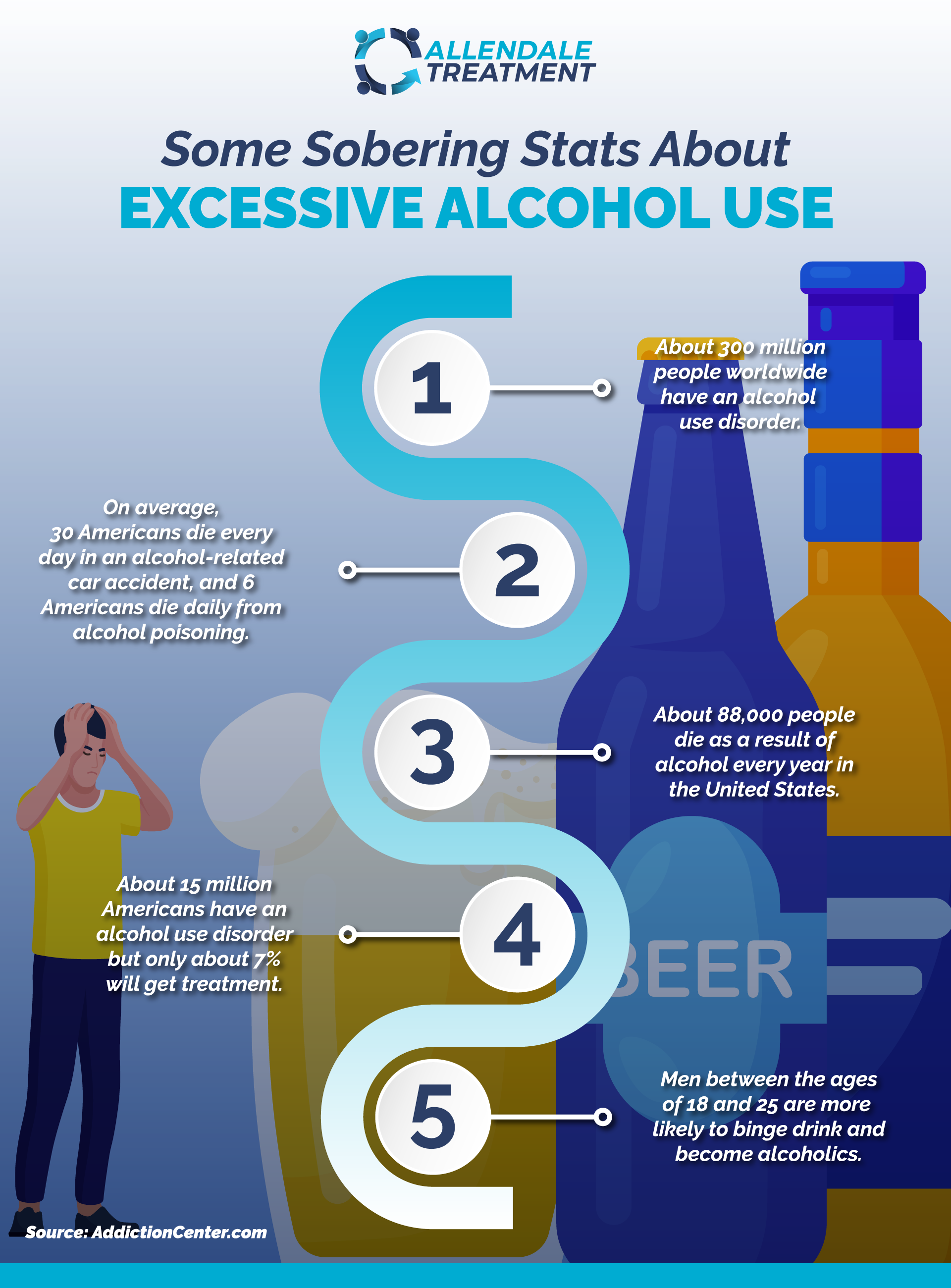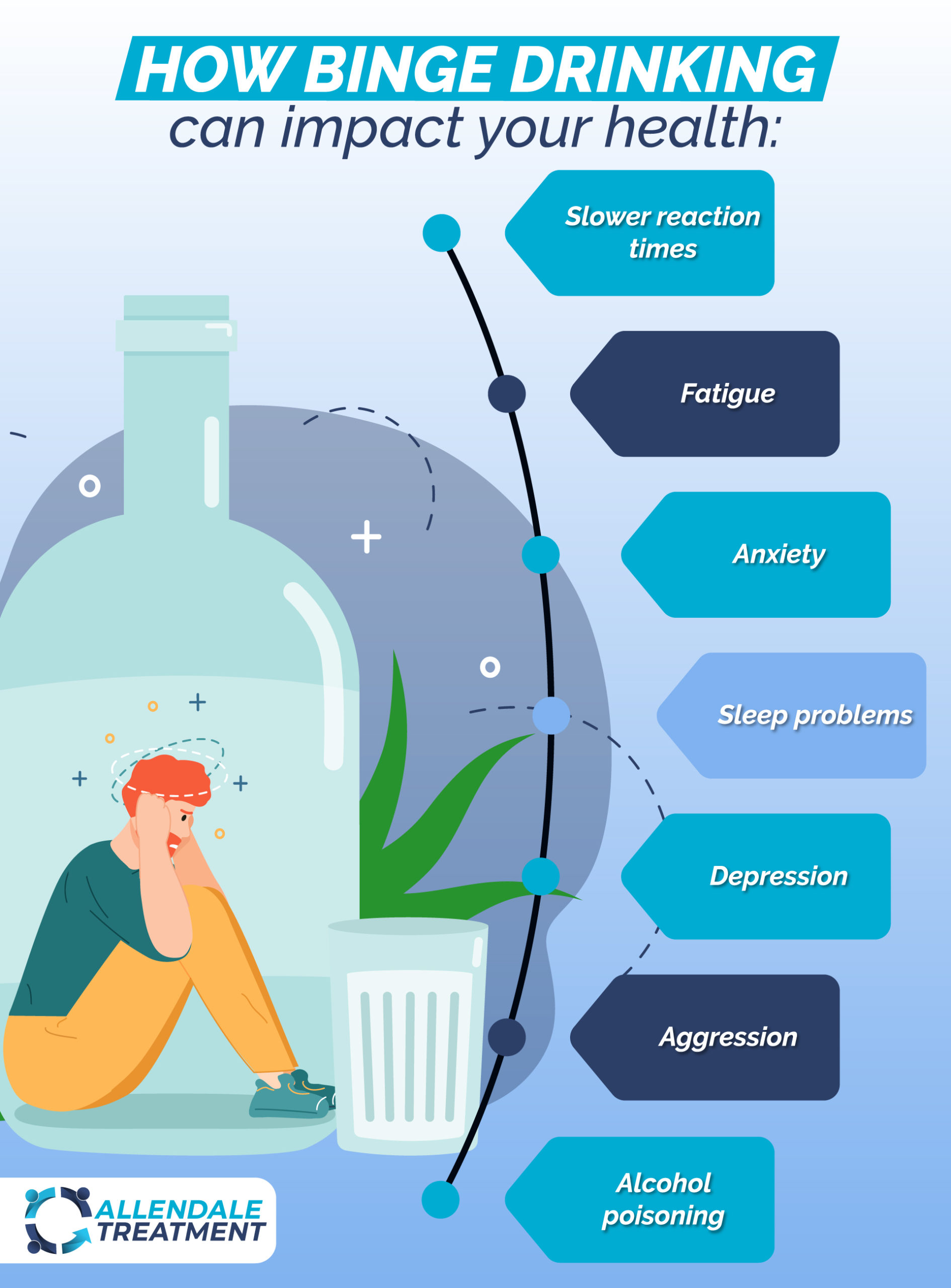A Sobering Look at Binge Drinking
A Sobering Look at Binge Drinking
During the pandemic, binge drinking increased by 21% as people used alcohol as a way to cope with stress and uncertainty. Scientists estimate that the increase in alcohol consumption during the pandemic will result in long-term health problems including 18,700 cases of liver failure and 8,000 additional deaths from alcohol-related liver disease by 2040.
Updated: 2023
Written by: Allendale Treatment
If you or anyone you know are struggling with addiction, call (833) 338-6946 to speak with a professional.
Defined as the consumption of 5 or more alcoholic drinks for men and 4 or more for women over a short period of time, binge drinking is something that isn’t a serious problem since people who binge drink are often not dependent on alcohol. However, binge drinking often leads to alcohol abuse and can cause a variety of health and safety issues.
One in six adults in the United States binge drink, with 25% reporting doing so weekly. Binge drinking is most common among younger adults aged 18–34 and is more common in men than in women. For many people, binge drinking is triggered by the fact that alcohol use is so socially acceptable. Many social occasions, from holiday gatherings to sporting events, revolve around alcohol. The chemical in alcohol can lower inhibitions and relieve stress, so some people binge drink when they are feeling overwhelmed or anxious.

While binge drinking frequency typically decreases with age, more than 1 in 10 people aged 65 and older reported binge drinking at least once a month. Adults with mild-to-severe alcohol use disorder are prone to binge drink as they’re unable to limit their intake. They often drink to avoid the negative emotional effects of not drinking and may obsess over when they can drink alcohol again.
Dr. Koob, Ph.D., is the director of The National Institute on Alcohol Abuse and Alcoholism (NIAAA) and says that binge drinking can quickly turn into a substance abuse disorder. “People who binge drink are more likely to develop alcohol use disorder,” says Koob. “Particularly if they continue to binge drink even if it causes them problems.”
Binge Drinking Culture in College
College has always been a popular time for young people to experiment with alcohol. Roughly 80% of college students consume alcohol and it’s estimated that half of those students engage in binge drinking. In one study, 19% of male students reported drinking 10 more drinks in a row in a two-week period compared to only 6% of female students.
Certain groups of college students are more likely to binge drink than others. One sampling found that 42 percent of college athletes reported binge drinking. While over half of male and female athletes said they binged drink, male athletes reported a slightly higher rate at 59 percent versus females at 53 percent. Another group that reported high levels of binge drinking was fraternities and sororities. While rates vary across campuses, membership in these groups increased the likelihood of a student participating in binge drinking.
College students are also unaware of the impact that the media they’re engaging with can have on encouraging behaviors like binge drinking. Tommy Streeter, a community outreach coordinator for Allendale Treatment and Fort Wayne Recovery says that the music, movies and TV he consumed were all something he had to be mindful of when he was working on his sobriety.
“When I started recovery, I was careful not to listen to music or watch movies that promoted substance abuse,” says Streeter. “It can be a slippery slope because you start to think that everyone is partying and you start feeling like you’re missing out if you’re not. This type of thinking can quickly take over and have a negative impact on your life.” Many college students agree with Streeter and say that binge drinking had taken a toll on their academics by causing them to miss classes, turn in assignments late, and interfere with their ability to maintain good grades.
How Binge Drinking Impacts Physical and Mental Health
Reaching a blood alcohol concentration of 0.08% or higher can cause significant impairments in judgment, impulse control, and motor coordination – all of which increase the likelihood of injuries. The Centers for Disease Control and Prevention estimates that more than half of all deaths involving alcohol each year are caused by binge drinking.
Even when people don’t have an alcohol use disorder, binge drinking can be harmful to their health leading to a variety of issues including:
Excessive drinking also costs the United States billions of dollars each year in lost work productivity, health care expenditures, criminal justice costs, and other expenses. Binge drinking accounted for 77% of these costs.
How to Prevent Binge Drinking from Occurring
The U.S. Dietary Guidelines recommends that people should only consume alcohol in moderation. This means no more than one drink a day for women and two for men. People who want to avoid binge drinking can be proactive by keeping track of how much they’re drinking, avoiding situations or people who will encourage them to binge drink and setting guidelines about when and how much they drink.
It’s also important to learn how much alcohol is in a standard serving size. Bars and restaurants often serve more than what’s considered standard, which is 12 ounces of beer and 5 ounces of wine, causing people to unintentionally consume more alcohol than they intend to.
Nate Moellering, a community outreach coordinator at Allendale Treatment and Fort Wayne Recovery says that it’s important to set boundaries and to stay away from any situation that may trigger you to drink too much.

“Consuming alcohol has become such a normal part of our culture that even when I go out to lunch, they’ll ask me if I want to see a drink menu, I laugh to myself and think not unless you want the cops here in a few hours, so I always tell people it’s better to avoid alcohol if they think they’ll have trouble moderating their drinking.”
“Consuming alcohol has become such a normal part of our culture that even when I go out to lunch, they’ll ask me if I want to see a drink menu, I laugh to myself and think not unless you want the cops here in a few hours, so I always tell people it’s better to avoid alcohol if they think they’ll have trouble moderating their drinking.”

Nate Moellering
Community Outreach
If you or anyone you know are struggling with addiction, call (833) 338-6946 to speak with a professional.


